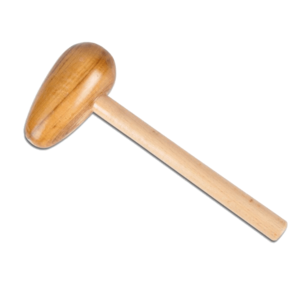Bossing Mallet: Difference between revisions
From DT Online
mNo edit summary |
|||
| Line 8: | Line 8: | ||
Used in conjunction with a '''[[Beaten Metalwork|Sandbag]]''' or wooden formers to rough out hollow shapes in sheet metal ''(e.g. to make a copper bowl)''. and resilient, shock absorbing cane handle. | Used in conjunction with a '''[[Beaten Metalwork|Sandbag]]''' or wooden formers to rough out hollow shapes in sheet metal ''(e.g. to make a copper bowl)''. and resilient, shock absorbing cane handle. | ||
<div class="buyers-guide"> | |||
=====DT Online Buyers' Guide===== | |||
</div> | |||
* They are sized by head diameter ''(35, 50, 60, or 75mm)''. The smaller sizes are used for art metalwork and the larger sizes are for shaping and stretching sheet metal and soft roofing material such as lead. | * They are sized by head diameter ''(35, 50, 60, or 75mm)''. The smaller sizes are used for art metalwork and the larger sizes are for shaping and stretching sheet metal and soft roofing material such as lead. | ||
Revision as of 16:56, 14 May 2016
Description
Bossing Mallets have 'egg-shaped' heads traditionally made from a split-resistant hardwood (e.g. Boxwood, or Lignum Vitea) but now more commonly made from Polyethylene or Nylon. They have resilient, shock absorbing handles made from Cane or hardwood such as Ash or Hickory.
Features and Uses
Used in conjunction with a Sandbag or wooden formers to rough out hollow shapes in sheet metal (e.g. to make a copper bowl). and resilient, shock absorbing cane handle.
DT Online Buyers' Guide
- They are sized by head diameter (35, 50, 60, or 75mm). The smaller sizes are used for art metalwork and the larger sizes are for shaping and stretching sheet metal and soft roofing material such as lead.
 |
| Emir 85 Bossing Mallet 75mm |
